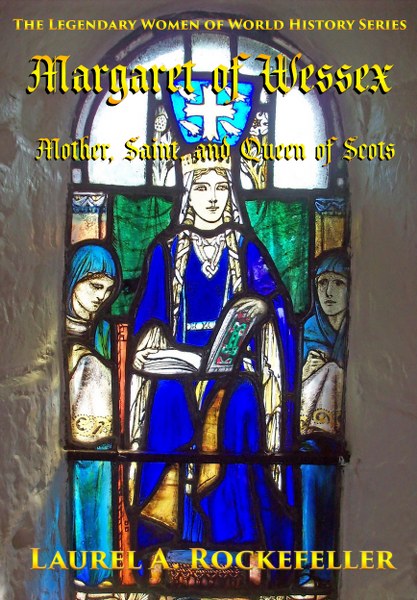Margaret of Wessex
The Legendary Women of World History Book 10
by Laurel A. Rockefeller
Genre: Historical Fiction
The 11th century was a dangerous time to be of the line unbroken of King Æthelred II Unread and his first queen, Æfgifu of York. Born in Hungary after King Canute III's failed attempt to murder her father, Edward the Exile, Margaret found her life turned upside down by King Edward the Confessor's discovery of her father's survival -- and the resulting recall of her family to England.
Now a political hostage only kept alive for as long as it served powerful men's interests, Margaret and her family found King Máel Coluim mac Donnchadh Ceann Mhor (Malcolm III Canmore)'s invitation to his court in Dunfermline in Alba the long-awaited answer to her prayers.
Scotland would never be the same again.
Includes two family tree charts, an expansive timeline covering over three thousand years of Pictish and medieval history, plus Roman Catholic prayers, and a bibliography so you can keep learning.
“Mother! Cristina! Margaret!” called Edgar hastily as he ran through
the mansion that was their accommodations during their stay in York.
Cristina emerged from her room, a towel over her wet hair, “What is it, Edgar? What’s wrong?”
“King William has bribed our Danish allies into leaving York and abandoning our defences across Northumbria.”
Margaret and Agatha emerged into the corridor. “You think we are in danger, Edgar?” asked Agatha.
“Mortal danger, Mama. Without those soldiers and sailors we have little chance of surviving if the king sends up his better trained knights. Already they’ve been in the field all year fighting in Mercia and against the Welsh kings and princes who like we English have no desire to be ruled by the Norman iron-fist. Those who have not taken up the sword and the axe are felling entire forests for the dozens of castles and fortifications the king is using against us—wood because it’s cheaper and faster than building in stone,” described Edgar.
“Are all the ships gone yet, Edgar?” asked Margaret.
“No, but most that are still here are readying to set sail for Denmark.”
“Can any be persuaded to head to Alba on the way?”
“Alba? Why Alba?” asked Cristina.
“King Máel Coluim Ceann Mhor invited us to come live at his court. I told the herald conveying the invitation that we are pleased to accept,” explained Margaret hastily.
Agatha stared at her daughter incredulous, “When did this happen?”
“Last Christmas.”
“You didn’t say anything to me about it! Shouldn’t you consult with the rest of us before you make such a decision for us?” scolded Agatha. “Or haven’t you read that verse in Exodus about honouring your father and your mother? Disrespectful child!”
Margaret met her mother’s eyes, annoyed at her mother’s attempt to guilt her into apologizing, “I didn’t say anything because the king’s spies were everywhere. The herald appeared ten minutes before King William’s soldiers forced me to appear in court so his friends could gawk at me and whisper lewd suggestions about me in the name of celebrating the king’s august majesty and
power. I didn’t think any of us wanted to be thrown into some pit to starve to death which you all know would have happened if the king suspected we were plotting to escape his ‘hospitality’ as his hostages. I’m rather surprised we secured permission to visit York in the first place.”
“I suggested our presence would deter further rebellion in the north. For surely no Saxon would wish harm to come to the last of King Æthelred II Unread’s blood,” reasoned Edgar.
“I assume the argument worked.”
“We are here, aren’t we?”
“True, but can we leave now we are here?” questioned Margaret.
“Only one way to find out,” suggested Edgar. “Will you help me?”
Margaret nodded, “I am yours to command!”
Margaret and Edgar slipped through the city streets quietly, walking discretely towards the Ouse River which twisted and wound through the central part of the city like a serpent. Shops selling anything and everything the Viking world could procure from every corner of Europe bustled noisily. Disguising their intentions by casually shopping and sampling different wares, they steadily worked their way towards King’s Staith Street where several Danish merchant ships moored. A young man carried a tightly woven wicker chest up a ramp onto a medium-sized merchant ship. An ornately dressed young woman in Danish-style dress walked with him, the richness of her gown, veil, and wimple contrasting greatly with the simplicity of the man’s tunic, trousers, and woollen brat cloak. Margaret adjusted her veil and wimple, suddenly self-conscious of her very Saxon-looking clothes, “God morgen!”
Reaching the ship and putting down his load, the man turned back towards them, “God morgen!”
“Nice day!” added Margaret.
“It rains all the time here, even here in Jorvik,” observed the man. “So I suppose since it is not raining at the moment, it is a nice day.”
“Might I ask—where is this ship sailing to once you depart?” inquired Margaret.
“Alba.”
“Where in Alba?”
“Normally Leith, but we have a special cargo designated for Dunfermline to deliver first.”
“Any chance there is room for passengers headed in the same direction?”
“How many?”
“Four.”
The lady studied Margaret and Edgar carefully, “I know you! Or at least of you. You, Sir, are the Ætheling!"
“I am,” confirmed Edgar confidently. “We want no trouble, only passage out of the city and to King Malcolm’s court for the two of us plus our mother and sister. We prefer to not attract any Norman attention in this matter—if you understand my meaning.”
“Perfectly,” affirmed the Danish lady. “Defying King William has its price—but you know that otherwise you would not be seeking escape now. If it were you alone, Ætheling, I would deny you. If there is trouble about, it is precisely because you and your earls have started it.”
“You cannot possibly consent to this Norman conqueror’s rule over England!” debated Edgar. “William is a blood thirsty thug who rules by terror and by the sword instead of following Jesus’ example and pursuing a policy of justice and mercy!”
“I don’t consent to the conqueror, Ætheling. But to stir up the people’s feelings about the king and then slip away from danger on the eve of real opposition from your enemy—this to me is cowardice!” countered the Danish lady boldly. “If your request did not include the women of your family, I would deny it. But for their sake I will consent to bringing you aboard—at a rate of one pound per person.”
“Highway robbery in most instances,” balked Edgar, knowing anyone else would pay no more than a schilling for the same journey north.
“But a fair price compared to what the Normans would pay us to deliver you to their hands,” countered the lady.
“Four pounds it is,” agreed Margaret, overriding her brother and handing them a mix of coins equalling four pounds. “When do you depart?”
“Three hours.”
“We will return within two hours,” promised Margaret.
“Done!” agreed the Danish lady.
“Done,” confirmed Edgar.
Cristina emerged from her room, a towel over her wet hair, “What is it, Edgar? What’s wrong?”
“King William has bribed our Danish allies into leaving York and abandoning our defences across Northumbria.”
Margaret and Agatha emerged into the corridor. “You think we are in danger, Edgar?” asked Agatha.
“Mortal danger, Mama. Without those soldiers and sailors we have little chance of surviving if the king sends up his better trained knights. Already they’ve been in the field all year fighting in Mercia and against the Welsh kings and princes who like we English have no desire to be ruled by the Norman iron-fist. Those who have not taken up the sword and the axe are felling entire forests for the dozens of castles and fortifications the king is using against us—wood because it’s cheaper and faster than building in stone,” described Edgar.
“Are all the ships gone yet, Edgar?” asked Margaret.
“No, but most that are still here are readying to set sail for Denmark.”
“Can any be persuaded to head to Alba on the way?”
“Alba? Why Alba?” asked Cristina.
“King Máel Coluim Ceann Mhor invited us to come live at his court. I told the herald conveying the invitation that we are pleased to accept,” explained Margaret hastily.
Agatha stared at her daughter incredulous, “When did this happen?”
“Last Christmas.”
“You didn’t say anything to me about it! Shouldn’t you consult with the rest of us before you make such a decision for us?” scolded Agatha. “Or haven’t you read that verse in Exodus about honouring your father and your mother? Disrespectful child!”
Margaret met her mother’s eyes, annoyed at her mother’s attempt to guilt her into apologizing, “I didn’t say anything because the king’s spies were everywhere. The herald appeared ten minutes before King William’s soldiers forced me to appear in court so his friends could gawk at me and whisper lewd suggestions about me in the name of celebrating the king’s august majesty and
power. I didn’t think any of us wanted to be thrown into some pit to starve to death which you all know would have happened if the king suspected we were plotting to escape his ‘hospitality’ as his hostages. I’m rather surprised we secured permission to visit York in the first place.”
“I suggested our presence would deter further rebellion in the north. For surely no Saxon would wish harm to come to the last of King Æthelred II Unread’s blood,” reasoned Edgar.
“I assume the argument worked.”
“We are here, aren’t we?”
“True, but can we leave now we are here?” questioned Margaret.
“Only one way to find out,” suggested Edgar. “Will you help me?”
Margaret nodded, “I am yours to command!”
Margaret and Edgar slipped through the city streets quietly, walking discretely towards the Ouse River which twisted and wound through the central part of the city like a serpent. Shops selling anything and everything the Viking world could procure from every corner of Europe bustled noisily. Disguising their intentions by casually shopping and sampling different wares, they steadily worked their way towards King’s Staith Street where several Danish merchant ships moored. A young man carried a tightly woven wicker chest up a ramp onto a medium-sized merchant ship. An ornately dressed young woman in Danish-style dress walked with him, the richness of her gown, veil, and wimple contrasting greatly with the simplicity of the man’s tunic, trousers, and woollen brat cloak. Margaret adjusted her veil and wimple, suddenly self-conscious of her very Saxon-looking clothes, “God morgen!”
Reaching the ship and putting down his load, the man turned back towards them, “God morgen!”
“Nice day!” added Margaret.
“It rains all the time here, even here in Jorvik,” observed the man. “So I suppose since it is not raining at the moment, it is a nice day.”
“Might I ask—where is this ship sailing to once you depart?” inquired Margaret.
“Alba.”
“Where in Alba?”
“Normally Leith, but we have a special cargo designated for Dunfermline to deliver first.”
“Any chance there is room for passengers headed in the same direction?”
“How many?”
“Four.”
The lady studied Margaret and Edgar carefully, “I know you! Or at least of you. You, Sir, are the Ætheling!"
“I am,” confirmed Edgar confidently. “We want no trouble, only passage out of the city and to King Malcolm’s court for the two of us plus our mother and sister. We prefer to not attract any Norman attention in this matter—if you understand my meaning.”
“Perfectly,” affirmed the Danish lady. “Defying King William has its price—but you know that otherwise you would not be seeking escape now. If it were you alone, Ætheling, I would deny you. If there is trouble about, it is precisely because you and your earls have started it.”
“You cannot possibly consent to this Norman conqueror’s rule over England!” debated Edgar. “William is a blood thirsty thug who rules by terror and by the sword instead of following Jesus’ example and pursuing a policy of justice and mercy!”
“I don’t consent to the conqueror, Ætheling. But to stir up the people’s feelings about the king and then slip away from danger on the eve of real opposition from your enemy—this to me is cowardice!” countered the Danish lady boldly. “If your request did not include the women of your family, I would deny it. But for their sake I will consent to bringing you aboard—at a rate of one pound per person.”
“Highway robbery in most instances,” balked Edgar, knowing anyone else would pay no more than a schilling for the same journey north.
“But a fair price compared to what the Normans would pay us to deliver you to their hands,” countered the lady.
“Four pounds it is,” agreed Margaret, overriding her brother and handing them a mix of coins equalling four pounds. “When do you depart?”
“Three hours.”
“We will return within two hours,” promised Margaret.
“Done!” agreed the Danish lady.
“Done,” confirmed Edgar.
**Special Promo!**
There are now TEXTBOOK versions of most of the Legendary Women of History series On sale for 99 cents versus $2.99 for the regular editions. The textbook versions add study questions to each chapter of the biographies.
You can find all the textbook editions at https://www.amazon.com/gp/product/B087CVGB1T
or on my website at https://bit.ly/LARtextbooks.
Sale ends June 30th!
Born, raised, and educated in Lincoln, Nebraska USA Laurel A. Rockefeller is author of over twenty-five books published and self-published since August, 2012 with editions spanning across ten languages and counting. A dedicated scholar and biographical historian, Ms. Rockefeller is passionate about education and improving history literacy worldwide.
With her lyrical writing style, Laurel's books are as beautiful to read as they are informative.
In her spare time, Laurel enjoys spending time with her cockatiels, travelling to historic places, and watching classic motion pictures and classic television series. Favorites: Star Trek, Doctor Who, and Babylon 5.
Laurel proudly supports Health in Harmony, The Arbor Day Foundation, and other charities working to protect and re-plant forests globally.
1 $15 Amazon Gift Card
1 signed paperback copy of Margaret of Wessex
1 audiobook: choice of Hypatia of Alexandria (English) or Catalina de Valois (Spanish)
Follow the tour HERE for exclusive excerpts, guest posts and a giveaway!








No comments:
Post a Comment